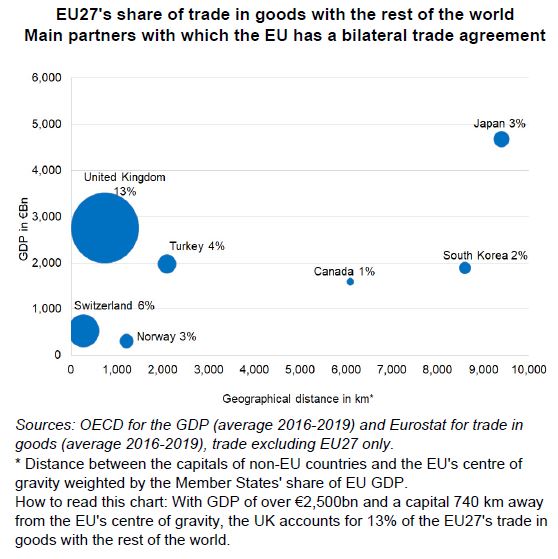The European Union's New Trade Relationship With the United Kingdom
The trade negotiations between the UK and the EU were exceptional in that they were about defining the contours of a less close relationship with a very close partner. The negotiations resulted in an agreement that respects British policy autonomy while preserving the integrity of the European single market. The agreement is characterised by the absence of tariffs and quotas, but it includes original provisions on fair competition.
The talks following the United Kingdom's decision to leave the European Union (EU) were unprecedented insofar as, unlike usual trade negotiations, the goal was to outline a looser relationship whilst mitigating adverse effects on trade and investment.
The negotiations, which were conducted in double-quick time – under a year – culminated in an innovative agreement that factors in the UK's desire to take back full decision-making control, its close economic and geographic proximity to the EU (see chart below) and the need to safeguard the integrity of the European single market.
In respect of market access, the agreement is similar to the so-called "new generation" free trade agreements that have been executed with, for instance, Canada and Japan. One of its main features is the lack of customs duties and quotas for all goods provided they meet "economic nationality" criteria or rules of origin. In addition, UK-based financial firms no longer benefit from the EU passport for cross-border financial services and there are specific rules of origin to spur the emergence of a European electric battery sector for the automotive industry.
The agreement's provisions on fair competition are especially innovative. To ensure open and fair competition and that trade and investment take place in a manner conducive to sustainable development, the agreement determines a framework for subsidies and sets minimum levels for labour, social and environmental standards. Compliance with these provisions is guaranteed by the dispute settlement procedure and by the option of taking unilateral sanctions. On environmental matters, it marks the first time an agreement mentions the Paris Agreement in a key clause.
.
